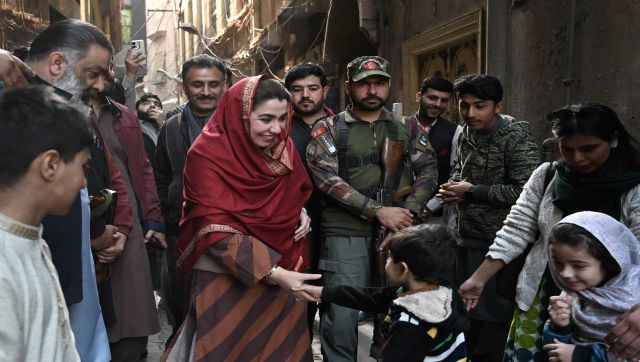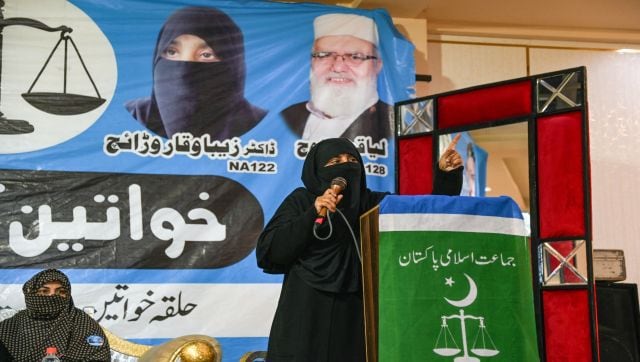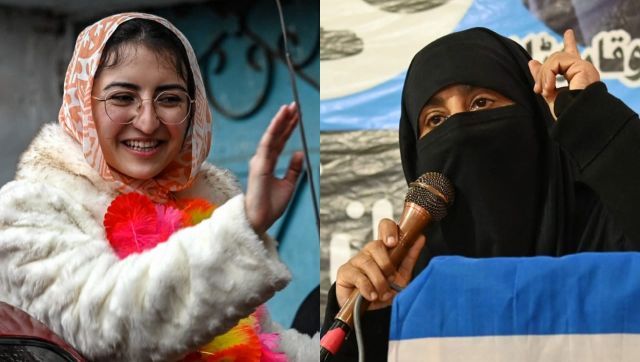The Pakistan elections are just two days away — they are scheduled for 8 February — and candidates, irrespective of gender, religion and party, are campaigning hard to make their mark in the polls. Among the thousands of candidates vying for a seat this election, a few hundred stand out as they are women, who have chosen to defy the conventional roles set for them. In fact, women’s participation in the country is poor — data reveals that of the 17,000 candidates contesting the 8 February polls, only 839 are women, which is an abysmal 4.7 per cent. We take a closer look at three women candidates and what they want from these polls. The first Hindu woman contesting polls This 8 February election is historic. That’s because
Dr Saveera Prakash , affiliated with the Pakistan Peoples Party (PPP), is contesting from Buner’s PK-25 constituency. By doing so, she becomes the country’s first Hindu woman running for election in the country. [caption id=“attachment_13696332” align=“alignnone” width=“640”] Dr Saveera Parkash, a Hindu candidate of the Pakistan Peoples Party (PPP) for provincial assembly, speaking to a shopkeeper during an election campaign rally in the Buner district of Khyber Pakhtunkhwa province. AFP[/caption] Prakash (25), who recently graduated as a doctor, said she chose the religion for herself — a decision respected by her Sikh father and Christian mother in the Muslim-majority country. “No religion in the world teaches a person to do bad deeds; every religion guides a person to do good deeds,” she was quoted as telling AFP. When asked what she hopes to change with her political foray, the doctor hopes to combat gender and religious biases. “I have always felt that girls experienced gaps in public life in Pakistan. Only 29 per cent of women in Buner are educated, whereas the country’s [average] literacy rate for women is 46 per cent. Women feel constrained in Pashtun culture due to social norms, so I decided to contest [to dispel this impression],” she told The Dawn when asked why she decided to run for office. What is even more noteworthy is that Dr Prakash chose to contest from a general seat and not a reserved seat. When asked about the same, she said she was doing it in a bid to increase the visibility of her community. A widow stands up Today, Samar Haroon Bilour is quite a known name in Pakistan politics. But her foray into the electoral world came under tragic circumstances. She stepped into her husband’s campaign when he was shot dead by militants shortly before the last election. The attack on her husband, Haroon, was claimed by the Pakistan Taliban, she said, the most active group in the region that once controlled some border areas. “I stepped into his shoes after his murder — it was one of the hardest things I had ever done, I was mentally not prepared,” she tells AFP. [caption id=“attachment_13696352” align=“alignnone” width=“640”]
 Samar Haroon Bilour, a candidate of the Awami National Party (ANP) speaks with children during an election campaign rally in Peshawar. AFP[/caption] She then went on became the first woman provincial MP in the provincial capital Peshawar, a city of nearly five million people nestled along the old Silk Road near the Afghan border and home to the Pashtun people — many of whom follow customs that restrict women’s movements in public. In fact, she recounts how when she stepped forward to continue her husband’s campaign for the Awami Workers Party, she faced backlash from her rivals. However, she persevered despite the taunts and came out on top. And today, she believes that attitudes are changing. “People want someone who gives time to the constituency regardless of what their gender is.” Hoping to ‘influence’ voters Lahore’s NA-122 constituency, which is seeing an interesting fight between Khawaja Saad Rafique of PML-N and Latif Khosa of PTI, has a third candidate that has caught the attention of many. She’s YouTuber Zeba Waqar, who is a gynaecologist by profession. A member of Jamaat-e-Islami, a right-wing party centred around religion, Waqar has built a fan base of over 17,500 followers on YouTube by uploading daily lectures about the Holy Quran and Hadith, and answering queries about Islamic teachings. [caption id=“attachment_13696372” align=“alignnone” width=“640”]
Samar Haroon Bilour, a candidate of the Awami National Party (ANP) speaks with children during an election campaign rally in Peshawar. AFP[/caption] She then went on became the first woman provincial MP in the provincial capital Peshawar, a city of nearly five million people nestled along the old Silk Road near the Afghan border and home to the Pashtun people — many of whom follow customs that restrict women’s movements in public. In fact, she recounts how when she stepped forward to continue her husband’s campaign for the Awami Workers Party, she faced backlash from her rivals. However, she persevered despite the taunts and came out on top. And today, she believes that attitudes are changing. “People want someone who gives time to the constituency regardless of what their gender is.” Hoping to ‘influence’ voters Lahore’s NA-122 constituency, which is seeing an interesting fight between Khawaja Saad Rafique of PML-N and Latif Khosa of PTI, has a third candidate that has caught the attention of many. She’s YouTuber Zeba Waqar, who is a gynaecologist by profession. A member of Jamaat-e-Islami, a right-wing party centred around religion, Waqar has built a fan base of over 17,500 followers on YouTube by uploading daily lectures about the Holy Quran and Hadith, and answering queries about Islamic teachings. [caption id=“attachment_13696372” align=“alignnone” width=“640”] YouTuber Zeba Waqar, an election candidate of the Jamaat-e-Islami (JI), a right-wing party addressing the women’s convention at a local banquet hall in Lahore. AFP[/caption] Speaking to The Dawn, she says, “I felt it was necessary for me to have a space on social media so that I could reach a wider audience. Electronic media does not give us much coverage, so my husband and I decided to create the channel.” A grandmother, she also runs a live-in institute where young women, including graduates from top universities, can learn the Quran. And what does she hope to change, if she is voted to power? She wants to address the economic disadvantages facing women, improve their professional training and introduce stronger laws to reduce harassment. Women candidates this poll season According to reports, former prime minister Imran Khan’s Pakistan Tehreek-e-Insaf party has allocated 53 seats to women, the most number of tickets among the major political parties. Of the 53, 28 are contesting the elections for the National Assembly constituencies, while 25 are for provincial seats. The main rival parties, however, have fallen short of even giving five per cent tickets to women. For instance, the Pakistan Peoples Party, led by Bilawal Bhutto Zardari, has given tickets to 35 women, 11 on National Assembly seats and 24 on provincial seats, which is just 4.5 per cent of its total 779 candidates. Meanwhile, former prime minister Nawaz Sharif’s party, the Pakistan Muslim League-Nawaz, has issued tickets to only 28 women, 12 for National Assembly and 15 for provincial seats, which is just 4.2 per cent of the 668 candidates fielded by the party. With inputs from agencies
YouTuber Zeba Waqar, an election candidate of the Jamaat-e-Islami (JI), a right-wing party addressing the women’s convention at a local banquet hall in Lahore. AFP[/caption] Speaking to The Dawn, she says, “I felt it was necessary for me to have a space on social media so that I could reach a wider audience. Electronic media does not give us much coverage, so my husband and I decided to create the channel.” A grandmother, she also runs a live-in institute where young women, including graduates from top universities, can learn the Quran. And what does she hope to change, if she is voted to power? She wants to address the economic disadvantages facing women, improve their professional training and introduce stronger laws to reduce harassment. Women candidates this poll season According to reports, former prime minister Imran Khan’s Pakistan Tehreek-e-Insaf party has allocated 53 seats to women, the most number of tickets among the major political parties. Of the 53, 28 are contesting the elections for the National Assembly constituencies, while 25 are for provincial seats. The main rival parties, however, have fallen short of even giving five per cent tickets to women. For instance, the Pakistan Peoples Party, led by Bilawal Bhutto Zardari, has given tickets to 35 women, 11 on National Assembly seats and 24 on provincial seats, which is just 4.5 per cent of its total 779 candidates. Meanwhile, former prime minister Nawaz Sharif’s party, the Pakistan Muslim League-Nawaz, has issued tickets to only 28 women, 12 for National Assembly and 15 for provincial seats, which is just 4.2 per cent of the 668 candidates fielded by the party. With inputs from agencies
Of the thousands of candidates in the 8 February Pakistan polls, only 839 are women, an abysmal 4.7 per cent. Meet Dr Saveera Prakash, Samar Haroon Bilour and Zeba Waqar, who are contesting the elections, and hoping to bring about change
Advertisement
End of Article


)

)
)
)
)
)
)
)
)



